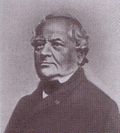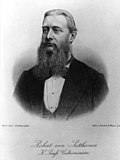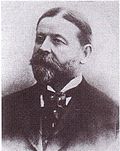| Name | Image | Term Start | Term End | Notes |
|---|
| Friedrich Ferdinand Alexander zu Dohna-Schlobitten | | 1808 | 1810 | |
| Karl August von Hardenberg |  | 1810 | 1814 | Also served as Prime Minister from 1804 to 1806, 1807, 1810–1822 |
| Friedrich von Schuckmann |  | 1814 | 1834 | |
| Wilhelm zu Sayn-Wittgenstein-Hohenstein |  | 1817 | 1819 | Police Minister |
| Wilhelm von Humboldt |  | 1819 | 1819 | |
| Friedrich von Schuckman | | 1819 | 1834 | |
| Gustav von Brenn | | 1834 | 1838 | |
| Gustav Adolf Rochus von Rochow | | 1838 | 1842 | Minister of the Interior and Police |
| Adolf Heinrich von Arnim-Boitzenburg |  | 1842 | 1845 | |
| Ernst von Bodelschwingh-Velmede |  | 1845 | 1848 | [1] |
| Alfred von Auerswald |  | 1848 | 1848 | |
| Friedrich von Kühlwetter |  | 1848 | 1848 | |
| Franz August Eichmann |  | 1848 | 1848 | |
| Otto Theodor von Manteuffel |  | 1848 | 1850 | |
| Ferdinand von Westphalen | | 1850 | 1858 | |
| Eduard Heinrich von Flottwell |  | 1858 | 1859 | |
| Maximilian von Schwerin-Putzar |  | 1859 | 1862 | |
| Gustav von Jagow | | 1862 | 1862 | |
| Friedrich Albrecht zu Eulenburg |  | 1862 | 1878 | |
| Botho August Wendt zu Eulenburg-Wicken |  | 1878 | 1881 | |
| Robert Viktor von Puttkamer |  | 1881 | 1888 | |
| Ernst Ludwig Herrfurth |  | 1888 | 1892 | |
| Botho August Wendt zu Eulenburg-Wicken |  | 1892 | 1894 | |
| Ernst Matthias von Köller |  | 1894 | 1895 | |
| Gustav Wilhelm Eberhard von der Recke von der Horst |  | 1895 | 1899 | |
| Georg Kreuzwendedich von Rheinbaben |  | 1899 | 1901 | |
| Hans Christian Friedrich Wilhelm von Hammerstein-Loxten |  | 1901 | 1905 | |
| Theobald von Bethmann Hollweg |  | 1905 | 1907 | |
| Friedrich Ludwig Elisa von Moltke |  | 1907 | 1910 | |
| Johann (Hans) Nikolaus Michael Louis von Dallwitz | | 1910 | 1914 | |
| Friedrich Wilhelm von Loebell |  | 1914 | 1917 | |
| Wilhelm (Bill) Arnold Drews | | 1917 | 1918 | |
Rudolf Breitscheid
Paul Hirsch |  | 1918 | 1919 | |
| Wolfgang Heine |  | 1919 | 1920 | |
| Carl Wilhelm Severing |  | 1920 | 1921 | [2] |
| Adolph Alexander Eberhard Dominicus |  | 1921 | 1921 | |
| Carl Wilhelm Severing |  | 1921 | 1926 | [2] |
| Albert Grzesinski |  | 1926 | 1930 | |
| Heinrich Waentig |  | 1930 | 1930 | |
| Carl Wilhelm Severing |  | 1930 | 1932 | [2] |
| Franz Bracht |  | 1932 | 1933 | Reich Commissioner (also Reich Minister of the Interior from December 3, 1932) |
| Hermann Göring |  | 1933 | 1933 | Reich Commissioner |
| Hermann Göring |  | 1933 | 1934 | Also Prime Minister from April 11, 1933 |
| Wilhelm Frick |  | 1934 | 1934 | Reich Minister of the Interior since January 30, 1933 |

